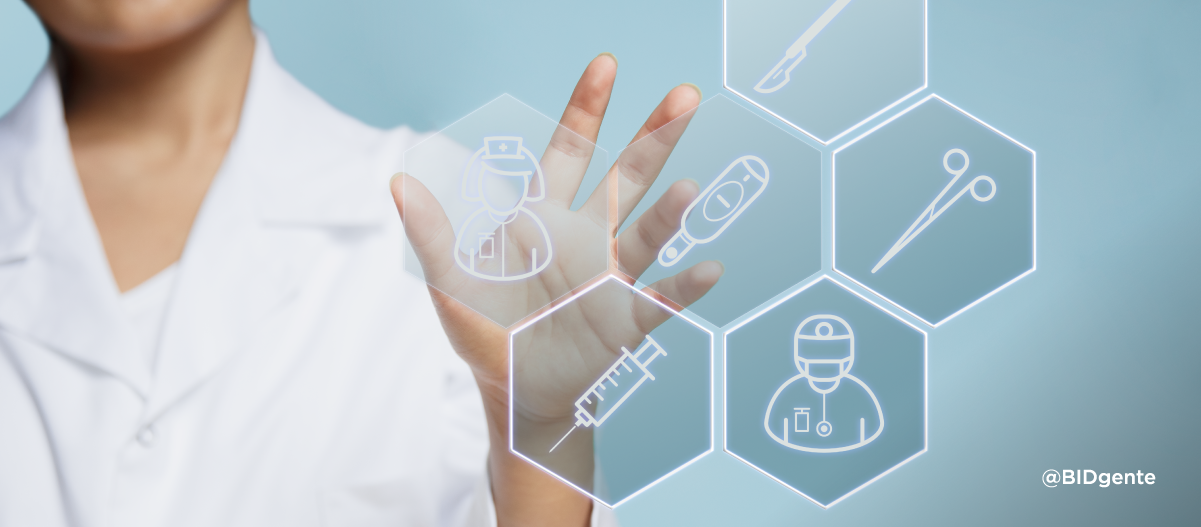THE FUTURE OF MEDICINE
Medicine is changing, in part because of the greater availability of individual health data, along with analysis techniques known as "big data."
This higher level of information will allow the advancement of precision medicine, with more personalized care and treatments. Increasingly empowered, the patient requires access and control over her information, according to her needs. Another big change will be the decentralization of services encouraged by mobile technologies, telemedicine, artificial intelligence algorithms, 3D printing and biosensors. Despite the fact that digital tools have been used in past health emergencies, the COVID-19 pandemic has been a universal catalyst for the digital transformation of both providers and consumers of health services worldwide.
The patient as the protagonist of their care
The paradigm in medicine is changing. This change puts the patient at the center, and assumes that he is committed and the protagonist of his care. The computer tools of telemedicine need this empowerment of the patient, respond to the need for information from him and transform him into an active agent of caring for him. In turn, these tools facilitate feedback, networking, and resource optimization.
The importance of the Electronic Health Record
One of the main sources of information for these tools is the Electronic Health Record (EHR). The Hospital Italiano de Buenos Aires (HIBA) developed a Health Information System (SIS) that has an online, unique, modular, problem-solving oriented, and patient-centered EHR. HIBA has recently been certified by HIMSS (Healthcare Information and Management Systems Society) as level 7, the highest level in the Electronic Medical Records Adoption Model, being the first hospital in Argentina and the second in Latin America to reach this level.
In addition, this institution has a Personal Health Portal that provides personalized information on the user's health (exam reports, self-management of shifts, news, among others) and works in direct interface with the Electronic Medical Record; where a secure audio and video channel is established for telemedicine services. The Institution is currently developing community portals that will put users with the same pathologies in contact with each other.
Medicine tailored to the patient
Probably the most significant impact of the new tools will be in the field of precision medicine. This considers the individual genetic variability, the environment and the lifestyles of each person in addition to the information obtained from mobile capture devices and biosensors. The precise study of the factors that influence health facilitated more accurate diagnoses, more rational disease prevention strategies, a better selection of drugs and the development of new therapies.
Medicine "tailored to the patient" involves the shift from a descriptive model to a predictive model of disease and risk. To implement it, it will be necessary to include information such as family, socioeconomic, environmental, behavioral and lifestyle background.
The patient himself will be the one who generates a large amount of information through the use of mobile technology, biosensors and self-monitoring tools that will allow the monitoring and recording of this data. The use of mobile technologies will also allow the capture of a large amount of data at the bedside of the patient, such as photographs of injuries.
Towards the decentralization of health services
Another change that will allow new technologies will be the greater decentralization of services. Through the current system, high-cost services are offered centralized and supervised by large and complex institutions. Instead, the shared economy model will take specialized professionals to their closest environment, overcoming obstacles to access health care, providing quality care. For example, the ECHO program allows decentralized care of patients with complex pathologies by professionals who work in a network with each other and with academic teaching centers, presenting results as good as those achieved in the reference center. The Hospital Italiano de Buenos Aires provides the infrastructure and technical support for telementoring projects where specialists in Hepatology train professionals from all over the country in Hepatitis and non-alcoholic fatty liver disease (NASH).
How to handle health data?
It is expected that the sources of information multiply, which will require an infrastructure that increases the storage and data management capacity. It will be vital to identify the inform
MARYELI GOMEZ, LAURA CORTES, JORGE FARFAN



Comentarios
Publicar un comentario